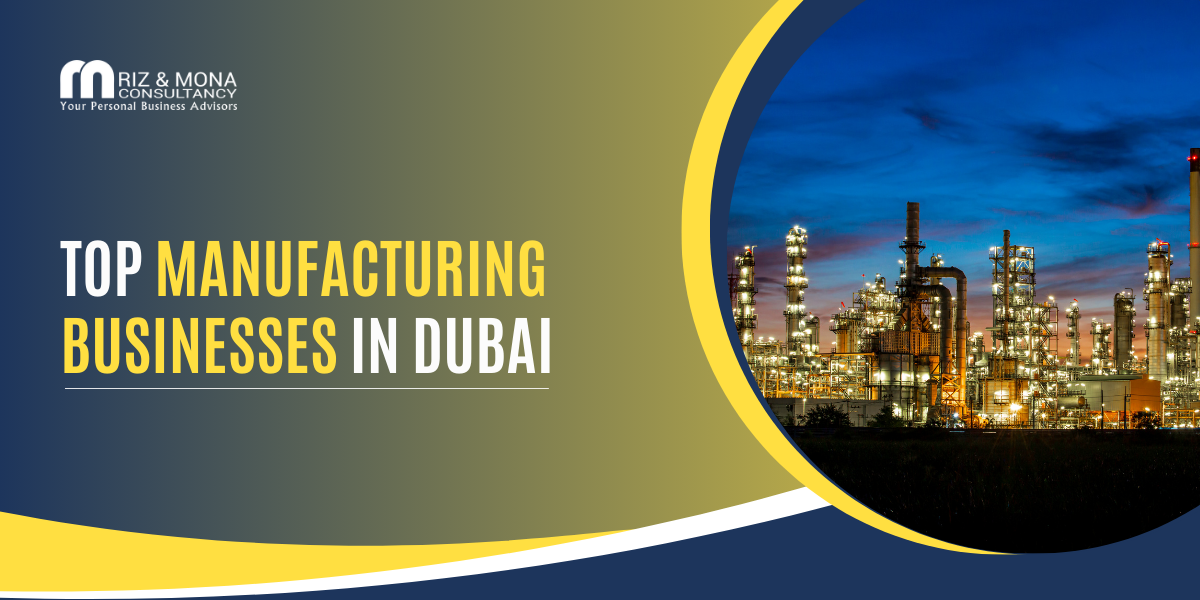Top 10 Small Manufacturing Business Ideas in Dubai, 2025
| # | Business Idea | Startup Capital Estimate | Business Opportunity & Market Insights |
|---|---|---|---|
| 1 |
Handmade Soap & Natural Skincare Products |
AED 50K–100K | Consumers are shifting to chemical-free products. Cold-process soap making requires minimal space and equipment. Approved products can be sold via e-commerce, boutique stores, and hotels. |
| 2 |
Spice Grinding & Packaging |
AED 80K–120K | Dubai is a re-export hub for raw spices. A small unit can serve households, restaurants, and grocery chains. Involves cleaning, grinding, blending, and packaging using basic machines. |
| 3 |
Eco-Friendly Bags & Packaging |
AED 70K–100K | Rising demand due to UAE’s plastic bag ban. Jute/canvas/recycled cotton bags are needed by supermarkets, retailers, and event organizers. Requires cutting, stitching, and basic printing tools. |
| 4 |
Scented Candles & Home Fragrance |
AED 40K–80K | Popular for gifts, home décor, and hospitality. Requires minimal investment in wax melters, molds, and packaging. Products can be sold in hotels, online, and at craft fairs. |
| 5 |
Custom T-Shirt & Apparel Printing |
AED 80K–130K | High demand from schools, gyms, and corporate clients for branded apparel. A heat press, vinyl cutter, and screen printing setup are sufficient to start. |
| 6 |
Paper Cups & Disposable Food Containers |
AED 120K–150K | Expanding food delivery services drive demand for hygienic disposable packaging. A compact paper cup machine meets the needs of restaurants and takeaways. |
| 7 |
3D Printing Services |
AED 100K–150K | Dubai supports innovation in 3D printing for design, healthcare, and construction. Small setups serve engineers, designers, and medical needs with prototyping and custom parts. |
| 8 |
Healthy Snacks & Baked Goods |
AED 70K–120K | Rising health consciousness fuels demand for sugar-free, gluten-free snacks. Production can begin in small licensed kitchens and supply gyms, cafés, and specialty grocers. |
| 9 |
Perfume Blending & Bottling |
AED 80K–130K | Dubai’s strong fragrance culture supports high local demand. Small-scale blending and bottling can build a unique brand. Registration is needed, but supplies are easily sourced. |
| 10 |
Customized Corporate Gift Production |
AED 90K–140K | Corporate events drive demand for branded gifts like mugs, USBs, notebooks. Fast local turnaround is preferred. Machines like sublimation printers or laser engravers are sufficient to start. |
Steps to Start a Manufacturing Company in Dubai, UAE
Choose the Right Jurisdiction: Mainland vs. Free Zone
-
Mainland (via DED): Ideal if you plan to sell directly within the UAE without restrictions. You can bid on local government contracts and supply retailers freely.
-
Free Zone (like Dubai Industrial City, JAFZA, or Dubai South): Offers 100% foreign ownership, tax benefits, and simplified import/export operations—but requires a distributor if you want to sell in the mainland.
Pro tip: Some free zones are purpose-built for manufacturing and offer pre-zoned land, built-to-suit warehouses, and subsidized utility costs.
Finalize Your Business Activity & Product Type
Before applying for a license, clearly identify the product manufacturing category. Industrial activities are listed under specific codes, and the licensing authority will approve or reject your application based on the nature of your business.
Examples:
-
-
Manufacturing of Plastic Bags
-
Processing and Packaging of Spices
-
Metal Fabrication
-
Food Supplement Production
-
Each category may have its own environmental or safety requirements.
Register Trade Name & Get Initial Approval
-
Propose a business name that matches your activity.
-
Submit for initial approval, which confirms that your business activity is permitted.
-
Prepare passport copies, business plan summary, and NOC if applicable.
Secure a Physical Facility (Land or Warehouse)
A manufacturing license cannot be issued without a physical facility. This could be:
-
A small factory unit (for light manufacturing)
-
An industrial plot to build on (for medium to large operations)
-
A pre-built warehouse (leased from the Free Zone authority)
Authorities will review your floor plan, utility needs, and machine layout before approving.
Apply for Environmental and Industrial Permits
Depending on your product, you may need:
-
Environmental Impact Assessment (EIA)
-
Health and safety approval (especially for food, cosmetics, or anything involving chemicals)
-
Fire safety clearance from Civil Defense
These must be completed before your final industrial license is granted.
Obtain the Manufacturing/Industrial License
Once your facility and approvals are in place:
-
Submit all documents to DED or Free Zone Authority.
-
Pay the licensing fee.
-
Receive your Industrial License, valid for one year and renewable annually.
Set Up Corporate Bank Account & Hire Staff
Now you can open a bank account in the company’s name. At this stage, you can also apply for:
-
Investor and employee visas
-
Labor and immigration files
-
UAE corporate tax registration (if required based on turnover)
Free zones often have in-house visa processing and labor support.
Start Procurement, Installation, and Trial Runs
With your license in hand, you can import machinery, install equipment, and start testing production lines. Keep all receipts and certifications on hand—they may be requested during inspections
Start Your Business Journey with Our Professional Support!
Business Process in Manufacturing Industry
The core of any manufacturing business lies in its manufacturing process chain—a structured flow that turns raw inputs into saleable products. This isn’t just about making things; it’s about designing an efficient, repeatable system where each stage directly impacts profitability, quality, and output.
Below is how the process typically unfolds in a functioning manufacturing setup:
Manufacturing Business Plan: From Vision to Blueprint
A manufacturing business plan is not just a pitch for investors—it’s a working document that helps you clarify your product, process, costs, and path to profitability. In Dubai, where licenses, compliance, and facility requirements are tightly regulated, having a detailed plan isn’t optional—it’s foundational.
Below is what a solid plan should cover, specifically for a UAE-based setup:
1. Product Definition & Value Proposition
Start by defining what you’ll manufacture and why it matters. Are you filling a local supply gap? Offering something more affordable, sustainable, or faster than competitors? This section should describe the product, its features, and the problem it solves.
2. Market Demand & Customer Segments
Use region-specific data where possible. Who will buy your product—retailers, government contractors, export buyers? Is the demand seasonal? Can you serve both the UAE and nearby Gulf countries? The more specific your customer mapping, the better.
3. Production Workflow & Facility Needs
Outline your process: what machinery you need, how much space it requires, what type of utilities (electricity, water, ventilation) are critical. Include estimates of production volume per day or per batch, and how long it takes to produce a unit.
4. Licensing & Regulatory Considerations
Note which licensing authority you’ll work with (DED or a Free Zone), and which permits you may need—such as environmental clearance, health and safety certifications, or quality approvals from ESMA. These impact timelines and costs.
5. Cost Structure & Capital Requirements
Break down your initial setup costs:
-
Business license and legal fees
-
Equipment and machinery
-
Facility lease and modifications
-
Raw materials and inventory
-
Staff hiring and visas
-
Utilities, insurance, and logistics
Then list your monthly operating costs and project your break-even point.
6. Revenue Model & Pricing Strategy
How will you price your product? Will you sell directly, through distributors, or both? Include assumptions about volume and margins. If you plan to export, mention FOB/CIF terms, expected duties, and currency impact.
7. Staffing Plan
List the key roles—machine operators, quality control, warehouse manager, driver, etc.—and estimate monthly salaries according to UAE labor standards. Make note of visa quotas and labor compliance requirements if you’re in a Free Zone.
8. Risk Management
Consider what could go wrong: supply delays, machine downtime, product recalls, or regulatory delays. Identify backup suppliers, maintenance schedules, and product testing protocols.
How to Manage a Manufacturing Business
Manufacturing is process-driven. At the heart of it lies production scheduling, which must align raw material availability, workforce shifts, and equipment capacity. Delays in any one of these areas create bottlenecks and erode margins.
Raw material procurement requires stable supplier relationships and contingency planning. Many UAE-based manufacturers use regional suppliers from India, China, and Saudi Arabia, with contracts that factor in shipping lead times and customs clearance.
Inventory control is critical, especially when dealing with perishables or seasonal products. Overproduction ties up working capital, while underproduction can damage credibility. Even small-scale facilities should implement basic inventory software with batch tracking to monitor input-output flow.
Machinery maintenance must follow a fixed schedule. In Dubai’s harsh climate, dust and temperature fluctuations can accelerate wear on machines. Preventive servicing—not reactive repair—reduces unexpected downtime and extends machine lifespan.
Budgeting in manufacturing isn’t just about upfront capital—it’s about monitoring variable costs over time. Raw materials, energy use, labor, and packaging are the four biggest cost centers. Each requires tracking against production volume and yield to protect your profit margin.
Understanding unit economics, how much it costs to produce a single item and what you earn from it—is essential. This lets you price products competitively while covering overheads and turning a profit.
In the UAE, manufacturers must also factor in VAT obligations (currently 5%). Businesses earning over AED 375,000 annually must register for VAT, maintain proper invoicing formats, and file returns quarterly. Non-compliance can result in fines or license suspension.
Dubai is strict about product quality, especially for food, cosmetics, electrical goods, and health-related items. A working QA system isn’t a formality, it’s a requirement to operate legally and compete credibly.
Local standards: ESMA (Emirates Authority for Standardization and Metrology) governs certifications for electrical products, cosmetics, food packaging, and more. Products entering retail often require Emirates Quality Mark (EQM) or Emirates Conformity Assessment Scheme (ECAS) approval.
International standards: Depending on your product and export targets, ISO certifications can boost your credibility. For example, ISO 9001 for quality management or ISO 22716 for cosmetics GMP (Good Manufacturing Practices).
Documented testing, lot control, and batch traceability are often inspected by authorities especially in food, pharma, and electronics.
Building a strong manufacturing business means looking beyond production to demand generation and delivery.
In Dubai, most manufacturers use B2B sales channels—supplying to retailers, hospitality groups, construction firms, or export buyers. Building direct relationships with procurement managers, attending trade shows (like Gulfood or The Big 5), and joining buyer-supplier platforms can open steady contract opportunities.
Retail channels—physical or online—may also be viable for niche or branded products. For example, locally made cosmetics or eco-friendly goods perform well on Noon, Amazon UAE, and in concept stores.
For businesses looking abroad, Jebel Ali Port is the gateway to over 150 shipping lines. Dubai’s strategic location makes it possible to ship to East Africa, South Asia, and Europe within a week, making exporting a natural growth strategy for most well-managed manufacturing companies.
FAQS (Frequently Asked Questions)
How much does it cost to start a manufacturing business in Dubai?
Startup costs typically range from AED 100,000 to AED 500,000 depending on the product, location, and facility needs.
Can a foreigner open a manufacturing company in the UAE?
Yes, foreigners can own 100% of a manufacturing company, especially in free zones or under approved mainland activities.
Which products are best to manufacture in Dubai?
High-demand sectors include food products, cosmetics, packaging, eco-friendly goods, and industrial components.
What licenses do I need for manufacturing?
You’ll need an Industrial License from DED (mainland) or a Free Zone Authority, along with environmental and safety approvals.
Is it better to start in a free zone or mainland?
Free zones offer full ownership and tax benefits, while mainland allows direct access to UAE markets without a local agent.
How long does the setup process take?
It generally takes 3–6 weeks for licensing and facility approvals, longer if special permits or construction are involved.
Can I export goods from my UAE-based factory?
Yes, especially from free zones with direct access to Jebel Ali Port and international shipping routes.
What industries are growing fastest in Dubai’s manufacturing sector?
Food processing, pharmaceuticals, sustainable packaging, and advanced electronics are seeing the most growth.















